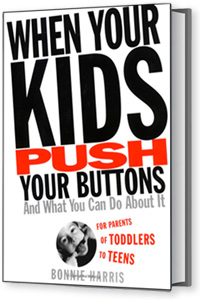Fantasy Play
Q. My 4 year old loves pretend play. She often starts out the day by saying, ” pretend I’m Peter Pan and you’re ….” It almost seems like a deep-seated need to play this way. I find that if I don’t play with her like this then she is harder to deal with. I guess another way I think about it, is that when I play with her and follow her direction, it fills her up. I haven’t studied child psychology, but I was wondering if you could provide more insight into this type of play.
A. You are exactly right. It fills her up. Imagine life for a young child. She is pretty much told what to do, when and how to do it all day every day. School only adds to that. Even after school activities are always adult directed. Our children have lost the opportunity to direct their own play. So when she directs you, she is getting that opportunity to lead, to decide, to direct, to imagine, to create. Let her direct you as much as you can stand. It is here she gets to call the shots.

Your 4 yr. old is at the developmental peak for fantasy and superhero play. It’s wonderful. She is working out more than you can ever imagine through this kind of play. Peter Pan is a superhero and an absolutely lovely one. Superheroes represent good vs. bad. At this age, it’s very hard for children to understand that good guys have bad qualities and bad guys have good. Right and wrong is black and white to them. Maturity will bring with it the understanding of the grays. Peter Pan actually has some gray areas. But now she is figuring out what’s good and what’s bad along with having the superpower to fly!
Play pretend with her until you can’t stand it anymore! I remember the day I told my son I just couldn’t play Superman and Lois Lane anymore. He sat down on a rock and cried!!
Honor Who Your Child is to Ensure Acceptance
Q. I have a 7 year old boy who is very happy at school where he is surrounded by many good friends and very respectful educators. The difficulty for him is when I suggest trying an extracurricular activity or when he has the opportunity to play with children he doesn’t know, or even when he has to ask for something in a shop where he doesn’t know the adult. He refuses to try anything that implies meeting new people. When I try to speak about it, he refuses and gets angry with me. When he started school, I stayed with him for several days until he made a new friend. That wasn’t a problem because his school allowed for parents to stay for as long as the child needed, but you cannot do the same in an extracurricular setting, as parents are not allowed to stay. I am unsure about how to proceed, whether it is a good idea to push him out of his comfort zone (and how much?) or respect his difficulty at this point.

A. It sounds like you might have an introvert or a shy extrovert (my term!). I am never in favor of pushing a child out of his comfort zone. It’s a bit by bit process and must be underscored by his knowledge that you get him—accept him just the way he is. Your job as his parent is to ensure that he feels understood by you so that he builds self-confidence and security. If he gets the message that you want him to be different (this is likely why he gets angry with you when you bring it up), then he will believe he is not okay the way he is. He may fight you on this or withdraw even more. Either way, he may lose confidence in himself.
You are the one with the issue about him not trying new things. He’s fine with it. Look at it as: He is not ready yet. Make sure you find a way to 100% unconditionally accept him for who he is — a kid who likes to watch before he jumps in, an observer who is likely very perceptive, cautious, discerning, quiet. He has shown you that when he is with people he knows and trusts, he does great. I applaud your school for allowing you to stay. More should be this way. I’m sure that has a lot to do with his comfort level at school.

You can certainly provide him opportunities to watch activities by going to sporting events, theater, concerts, etc. with him to see what might spark his interest. When he feels motivated and confident, he will find his way. He has good friends, so he is not a loner—not that that’s a bad thing either. My guess is that he is just fine, but that you have fears about him not being outgoing and getting involved in new experiences. This may be a situation of you letting go of a preconceived notion of what is best for him. He will when he is ready, feels confident and motivated to push himself.
When he knows that you support who he is fully and unconditionally, he will be more willing to listen to suggestions you have WHEN he wants to be more courageous. Follow his lead. That doesn’t mean keeping him protected and at home away from activities. But I think any form of pushing will lead him to believe he’s not good enough for you.
Also, you might want to read the book “Quiet”.
Understanding the Draw of Xbox
Q. I am a mum of twin boys age 15 and I find every day a battle. On the other hand, when I read your emails, I realize that I actually create those battles as I don’t make an effort to understand my children at all. Shouting, hiding Xbox don’t seem to work. When I am able to listen and show them I am not against them I get amazing results. I have been hiding the Xbox or blocking access to it for a long time as they are not very good at time management but realize that I don’t achieve anything with that. Negotiations do seem to work, however they find it very difficult to let it go and move away after a number of hours playing. Maybe that is a good time to block it or take away as I am the parent. I don’t seem to get too many objections then. But I still find it very difficult to understand that when we agree on a length of time, they are not able to stick to the agreement. With one boy I get pushed around, sworn at like I am the enemy.
My current challenge is that one of my boys constantly smacks me like 2 year old when I tell him that it is time to get of the Xbox after several hours or he demands via standing in front me that he gets it back. He corners me from time to time when he does not get his way. As he is taller than me this makes me feel afraid and vulnerable.

A. The hitting, intimidating, swearing problem comes down to your own self-confidence and psychological strength. Physical size should have nothing to do with it other than your son’s found ability to use it to intimidate you. But that means you can be intimidated. You must stand in your strength, your own personal power and know deeply what you deserve and what you don’t. This is often a parent’s biggest struggle and requires doing your own therapy or personal work to find your strength and self-confidence.
Your boys are not able to stop playing at the appointed time because they are doing what is most engaging to them. This is a different perception from “won’t” stop playing. The games are too enticing for them to look at the clock and then decide, Oh, we’d better get off because Mom wants us to. We parents have to realize that the way these games have been designed, they can become addictive because they are way more fun and challenging than anything else they would do if they stopped playing. What is better? Why would they want to get off? Especially if you can be intimidated, why would they not argue you down? Many kids feel more successful playing these games than doing anything else in life. Those are the expectations you must hold. There’s nothing wrong with your boys’ desire to play. The problem is with the enticement of the games themselves. When you are more understanding of the draw and why your boys love to play, then you will have a more valid (in their eyes) point of view.
You have said in your question that negotiations tend to work and you get results when you listen. So keep that up. It’s too easy to fall back on punishment, but it will only backfire and continue to make your job harder and push your boys further away.

Find a good time to problem solve, negotiate and come up with an agreement. “We have not yet found a way for all of us to work out this issue of Xbox. I want you to play x hours and you would not like any time restrictions at all. As your mom, it is my job to make sure you get exercise and do other things. I know what an enticement Xbox can be and I don’t expect you to want to stop playing. So we need to come up with a plan we can all agree on. When and how much time do you think is reasonable for you to play?”
Make sure they understand the one rule of problem solving — the solution must be agreed on by all. And infringements of the agreement go back to more problem solving, NOT taking away their time playing. After an agreement is made, set a time for a week away to evaluate the agreement. Say nothing in the meantime. At the time of evaluation, you will all get to say whether or not the agreement worked for you. As soon as you take away their time or the device itself, you are inviting them to hoard their time even more.
I am going to include a couple of articles I’ve written to hopefully help –
https://bonnieharris.com/gaming-hobby-or-addiction/
https://bonnieharris.com/give-up-screentime-fights/
https://bonnieharris.com/hindsight-on-gaming-and-screentime/
Also an article I really like – http://project-based-homeschooling.com/camp-creek-blog/sliver-or-how-stop-fighting-about-screen-time
To submit a question, email me at bh@bonnieharris.com with your short question and I will answer you within a few days. It may appear in the newsletter at a later date.
 We punish our children in an attempt to keep them from pushing our buttons, often escalating the original problem into a cycle of anger and blame. When Your Kids Push Your Buttons is not about what to do to your kids to get them to stop pushing your buttons. This book is about how to be the parent you wish you could be-the parent that only you are holding yourself back from.
We punish our children in an attempt to keep them from pushing our buttons, often escalating the original problem into a cycle of anger and blame. When Your Kids Push Your Buttons is not about what to do to your kids to get them to stop pushing your buttons. This book is about how to be the parent you wish you could be-the parent that only you are holding yourself back from.
https://bonnieharris.com/gaming-hobby-or-addiction/







